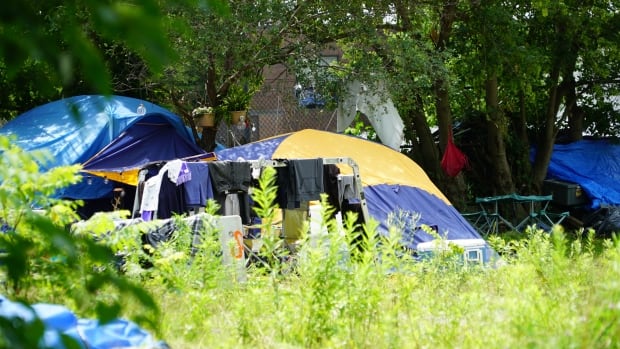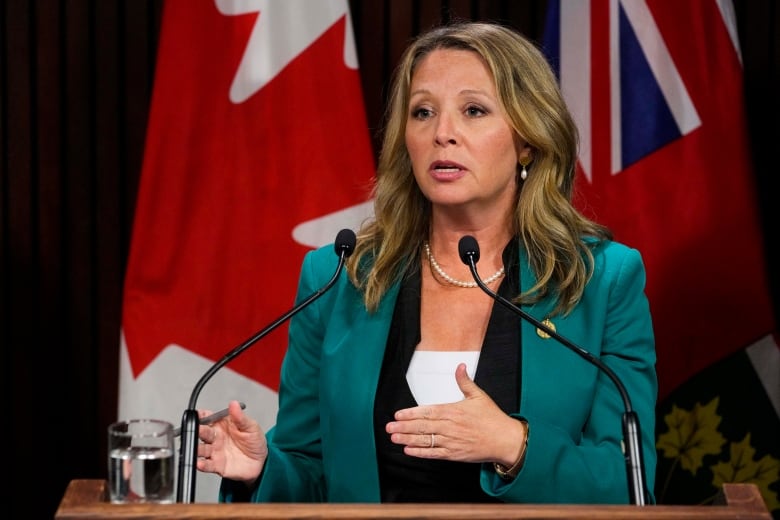
Thirteen Ontario city mayors are asking Premier Doug Ford to use the notwithstanding clause to override a court decision preventing municipalities from clearing homeless encampments if their shelters are full.
In the letter dated Thursday, the mayors call for several measures to help municipalities deal with problems related to mental health, addiction and homelessness in their communities. The mayors say the use of the notwithstanding clause would ensure the measures are implemented effectively.
“We ask for your immediate attention to this matter and look forward to working with the Government of Ontario to realize positive changes to very complex issues,” the mayors wrote in the letter.
The letter is signed by Barrie Mayor Alex Nuttall, Brampton Mayor Patrick Brown, Brantford Mayor Ken Davis, Cambridge Mayor Jan Liggett, Chatham-Kent Mayor Darrin Canniff, Clarington Mayor Adrian Foster, Guelph Mayor Cam Guthrie, Oakville Mayor Rob Burton, Oshawa Mayor Dan Carter, Pickering Mayor Kevin Ashe, St. Catharines Mayor Mat Siscoe, Sudbury Mayor Paul Lefebvre and Windsor Mayor Drew Dilkens.
The letter comes after Ford called on the mayors on Tuesday to demand that he use the notwithstanding clause to pass legislation that would give them more tools to deal with homelessness.
“I have an idea: Why don’t the big city mayors actually put in writing that they want the province to change the homeless program, make sure that we move the homeless along, and why don’t they put in: ‘Use the notwithstanding clause,’ or something like that,” Ford had said.
“That’s what they should be doing… Let’s see if they have the backbone to do it, if they really want the homeless situation to improve,” he said.
“Big city mayors, you want to get it done, I need that letter.”
The notwithstanding clause is needed because of a decision in January 2023 by the Ontario Superior Court of Justice. Justice M.J. Valente ruled that Waterloo Region could not use a municipal bylaw to evict people living in an encampment in Kitchener because that bylaw was deemed to be in violation of Section 7 of the Canadian Charter of Rights and Freedoms. The judge said a lack of shelter spaces means the bylaw infringed upon Charter rights.
“I declare that the By-Law is inoperative insofar, and only insofar, as it applies to prevent the residents of the Encampment from living on and erecting temporary shelters without a permit on the Property when the number of homeless persons exceeds the number of available accessible shelter beds in the Region,” Valente wrote.
In the letter, the mayors ask the provincial government to do the following:
- Become an intervenor in any court case that restricts the ability of municipalities to regulate and prohibit encampments, following the principle endorsed by the U.S. Supreme Court that courts should not be dictating government policy on homelessness.
- Strengthen the system of mandatory community-based and residential mental health care and to expand service to treat those who have severe addictions.
- Implement a drug and diversion court system across the province and ensure there are necessary resources to allow a focus on rehabilitation as opposed to incarceration.
- Amend the Trespass to Property Act to include a separate provision for “repetitive acts of trespass,” the penalty for which should include incarceration, and to allow a police officer to arrest a person who commits repetitive acts of trespass after being told by police not to engage in such activity. These amendments should also include an option for referral to a diversion court.
- Enact legislation providing guidance on the “open and public” use of drugs being prohibited in the same way that open consumption of alcohol is banned.
Grace Lee, spokesperson for the premier, said in a statement on Thursday: “We have been clear that we will explore every legal tool available to the province to clear encampments and restore safety to public spaces.
“While cities remain at the forefront of issues relating to municipally owned lands, we are examining which additional tools the province can provide to help municipalities effectively manage these ongoing challenges,” Lee added.

Leaders of Ontario opposition parties say the notwithstanding clause is not the answer.
“The solution to encampments and homelessness is housing. The housing doesn’t exist,” Ontario NDP Leader Marit Stiles told reporters at Queens Park on Thursday.
Stiles said the government needs to work with municipalities to build affordable housing and it should bring back rent control.
Mike Schreiner, Ontario Green Party Leader, said on Thursday that using the notwithstanding clause is an “extreme” action.
“To me, this is a complete failure of the Ford government to build deeply affordable, non-profit, co-op and supportive housing. If they are going to take the extreme measure of taking the constitutional rights away from people who are experiencing homelessness, where are those people going to go? There are no homes for them to go to.”
Schreiner said if he was premier, he would not consider the mayors’ request.